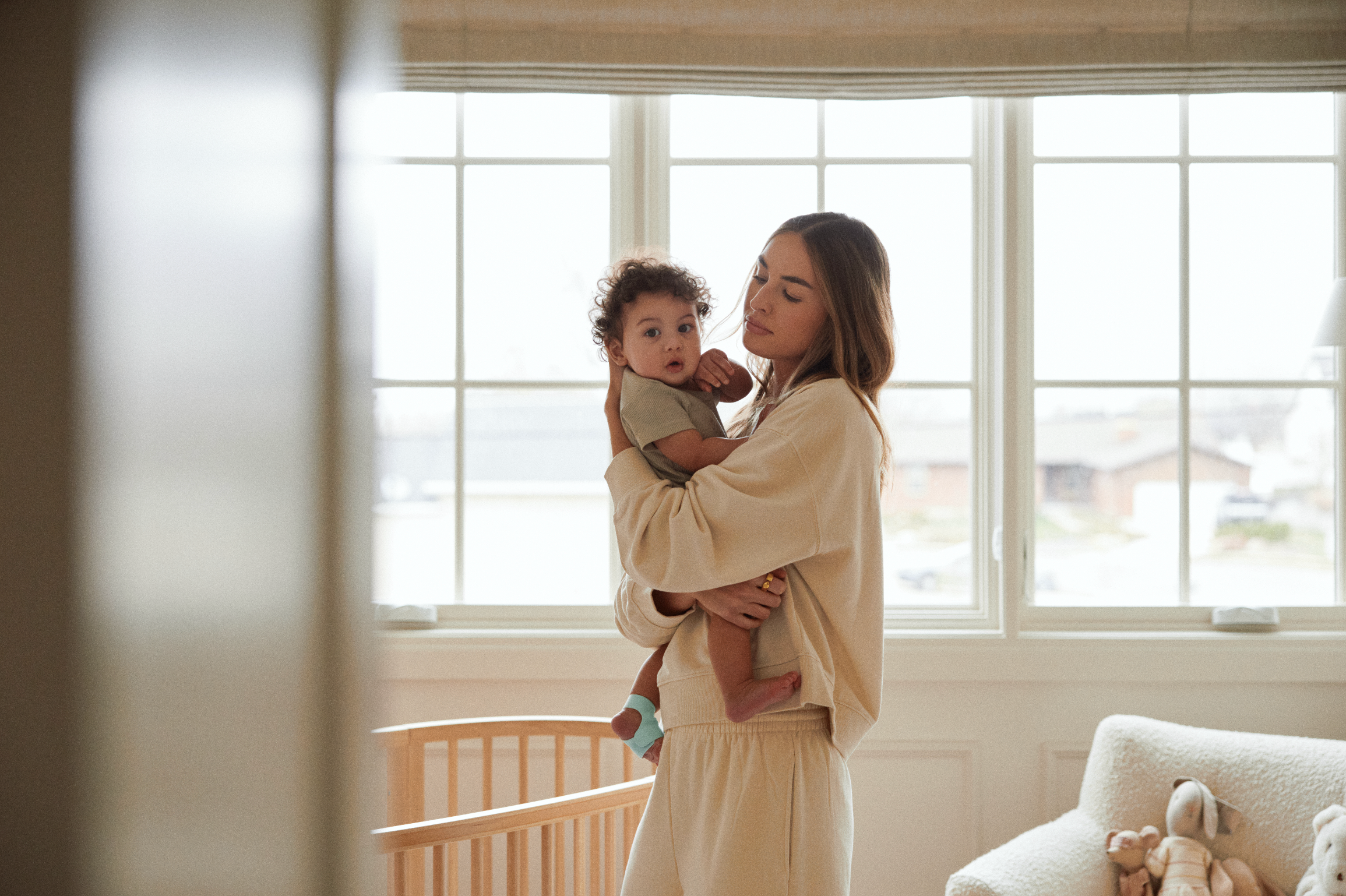Baby Sleep Guide: How Much Sleep Does Your Baby Need?

Written by: Susan Wallace – Baby Sleep Expert and Potty-Training Consultant
One of the most debated topics between both parents and professionals is ‘how much sleep does a baby need?’.
This can be difficult to measure, as each child has unique needs - not only based on their age and developmental stage, but also influenced by factors such as exercise, what time they fell asleep and whether they are feeling unwell.
Recommended Sleep Duration by Age
So, what are the recommended sleep durations for children?
The World Health Organisation, American Academy of Sleep Medicine and The National Sleep Foundation all recommend the following sleep times per age (per 24-hour period):
- 0 – 3 Months: 14 -17 Hours
- 4 – 11 Months: 12 – 16 Hours (the National Sleep Foundation recommends slightly lower at 12 – 15 Hours)
- 1 – 2 Years: 11 – 14 hours
- 3 – 4 / 5 Years: 10 – 13 Hours
All 3 of these organisations unanimously agree that:
- Sleep needs decrease with age
- Each age group has a sleep ‘range’ rather than ‘exact’ amount of time to account for individual differences
What these do not tell us is how this sleep should be divided between nap sleep and night sleep, nor what wake up and sleep times they recommend.

Sample Schedules for Babies and Toddlers
Here is a guide that may be helpful for those who find comfort in predictability. However, please note that this is not the 'golden standard', but rather a guide to be adapted to the unique needs and behaviours of each child.
Under 5 Months:
Set schedules are often unhelpful for this little age. Children are still developing their circadian rhythm and not able to regulate wake / sleep hormones consistently. Newborn babies do not even make the sleep hormone Melatonin for the first few weeks of life.
Some families use "wake windows," which involves calculating the time between sleep periods to predict when to 'try' for the next nap. Others prefer to monitor sleepy cues or simply adapt nap times based on the baby's needs and the family's schedule. It can also help to establish a consistent wake time each morning, e.g. 8am, and expose the baby to natural daylight during the day to encourage the development of a clear day/night distinction.
5-9 Months:
Most children in this age range respond well to a wake-up time between 6-7am. While many will start with three naps a day, they typically transition to two naps by 9-10 months. Some may adjust to two naps as early as 6 months, while others continue with three naps until around 9.5–10 months. A bedtime between 6–8 p.m. suits many children at this stage, but individual preferences can vary. If a later bedtime works for your child, there’s no need to change it.
10-18 Months:
At this stage, most children take two naps a day, gradually shifting to one nap between 14–16 months, though this can happen as early as 12 months or as late as 18 months. A consistent wake-up time of 6–7 a.m. and a bedtime between 6–8 p.m. works well for many children.
18 Months – 4 Years:
By 18 months, most children take just one nap. The age at which children stop napping varies greatly — some may give up naps before their second birthday, while others may still nap at 4 years old. Many families find that an earlier bedtime helps support this transition. A bedtime in the early evening works well for most, but some children may prefer a later bedtime based on their individual needs.
How to Determine your Baby’s Individual Sleep Needs
Research suggests that sleep needs can be influenced by factors like bedtime routines, activity levels, light exposure, and even daily hormone fluctuations — rather than being fixed to a specific number of hours each day.
Documenting your child's sleep times each day can help to determine what works best for them, allowing you to create a schedule that suits their individual needs.
Dream Sock® is a Medically-Certified smart baby monitor which provides real-time monitoring of pulse rate, oxygen level and sleep patterns. Its advanced predictive sleep technology helpfully documents sleep duration and predicts nap times based on your baby's individual needs, taking the guesswork out of sleep schedules. It adapts as they grow, relieving parents of the stress of continually updating schedules.
How to Adapt to your Baby’s Unique Sleep Needs
As a Sleep Consultant who has supported thousands of families with infant sleep, I believe in a ‘Family Centred’ approach to naps and bedtime. In order to reduce potential stress it is important that naps work for an individual child, as opposed to trying to place the child into a one size fits all schedule. While average sleep guidelines can be helpful for many children, the reality is that every family’s situation is different. Without some flexibility, sticking to a strict schedule can sometimes create more stress than support.
So instead, here are my recommendations:
Child’s behaviour - To get a better sense of whether your child is getting enough sleep, it’s more helpful to look at their behaviour and mood than to rely on a generic sleep schedule. Are they often irritable and grumpy? This could be a sign they need more rest—even if they’re getting the “recommended” amount. On the other hand, if they’re generally alert and engaged, it’s a good sign their sleep needs are being met.
Be flexible - Real life means that we often have to adjust schedules. Sleep schedules may have to be adjusted based on family commitments, such as school runs or the child's activity levels. After a high sensory experience such as swimming, your child might need a longer nap to recharge.
Schedule down time – rest is not just about sleep. Children need unstructured time just to ‘be’ outside of groups and activities.
Don’t change something which works – if your child follows a schedule that's different to what is promoted online, there is no need to change it if it works for you both.
Follow your instinct - be true to your own personality and needs. If you love a schedule, then great! If you prefer flexibility, you may find it more beneficial to follow your child’s cues on any given day.

Key Factors That Influence Your Child’s Sleep Schedule
In recent years, there has been growing belief that children should follow a set sleep schedule. However, as research is limited on this topic, these sleep schedules are not evidence based. Instead, they are often based on someone's personal experience. While they might work well for some families, they may not be the right fit for everyone. Whether or not they help depends on the child's temperament and parents' own personality.
Parental Preferences
Some parents naturally crave routine. They feel most secure and in control when they have a predictable schedule to work from — often enjoying things like to-do lists, planning ahead, and sticking to set schedules. For these parents, having a consistent sleep routine for their baby can feel really helpful and reassuring. However, when things don’t go to plan — like when naps shift or routines are disrupted — they might find it more difficult to adapt and may feel stressed during transitions between sleep stages.
On the other hand, some parents find strict schedules restrictive. They may feel that rigid routines compromise their daily activity, and prefer a more flexible, go-with-the-flow approach. For these parents, the idea of following a set schedule might even feel overwhelming.
Child’s Personality
Another important consideration is the needs, personality and temperament of the individual child. Every child is different when it comes to sleep. Some are really adaptable to sleeping in a range of different environments while others prefer the same predictable environment to feel settled. For those who prefer predictability, it can be harder for them to get the rest they need if they are in an unfamiliar place (for example on holiday or at daycare).
Additional Factors
Aside from this there are many factors that can influence the sleep environment of a child. Sleep needs can change depending on how much energy they have used, how much natural light they've experienced and even what time they go to bed. Some research suggests that children who go to sleep earlier tend to sleep longer overall than those with later bedtimes (Source). Additionally, simple strategies like baby massage can support better sleep for some babies, while things like illness or new developmental milestones can temporarily disrupt their usual sleep patterns.
Modern life has had a big impact on how we sleep - both for children and adults. We spend much less time in natural light, which used to help regulate our 24-hour wake-sleep cycles. Instead, we now spend more time indoors surrounded by artificial light, even late into the evening. We are also eating more processed foods and getting less exercise, all of which can impact our sleep needs.
Other circumstantial factors can also affect how much sleep a child gets, such as parents' work schedules, daycare nap policies and having siblings. For example, school drop-offs may interrupt a younger child's nap time, making it harder to stick to a consistent routine.
All these factors can make it very difficult to determine how much sleep, and when a child should sleep on any given day.
When it comes to baby sleep, there is no universal one-size-fits-all approach. While general sleep guidelines provide a helpful starting point, each child’s sleep needs vary based on individual factors.
The best sleep routine is the one that works for your family, balancing both your child’s well-being and your daily rhythms. Whether you prefer structure or a more adaptable approach, trust your instincts and find a solution that keeps both you and your baby well-rested. And with tools like Dream Sock®, parents can gain valuable insights into their baby's sleep patterns, making it easier to support healthy sleep habits.
Author – Susan Wallace
Susan Wallace is a highly experienced Baby Sleep Expert and Potty-Training Consultant, as well as a Baby Yoga and Massage Educator. As the founder of Settled Petals, she provides gentle, expert guidance to help families establish healthy sleep habits and confident potty training.
With over 20 years of experience and qualifications from Cambridge University and a Master’s in Social Work, Susan has supported thousands of families worldwide. Passionate about children’s well-being, she offers one-on-one support and professional training, empowering parents with practical, nurturing solutions for a more restful and settled start to life.
















